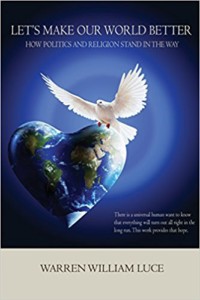Title: Let’s Make Our World Better: How Politics and Religion Stand in the Way
Author: Warren William Luce
Publisher: Green Ivy Publishing
ISBN: 978-1-946043-92-4
Pages: 253
Genre: Philosophy/Religion
Reviewed by: CC Thomas
Pacific Book Review
In Let’s Make Our World a Better Place: How Politics and Religion Stand in the Way, author Warren William Luce has introduced a book for the thinking Christian, a book long overdue. Most works discussing religion focus on following the same old dogma and teachings of the traditional church. This book and Luce’s observations are a breath of fresh air in a tired and rehashed genre.
When I say this is a book for the “thinking Christian,” I do not mean to imply that Christians, as a group, don’t think. However, as a life-long Christian, I have often felt that much of what has been taught, both from the pulpit and in small groups discussions, aren’t a give-and-take between the speaker and the audience. Rather, it often feels as if there are just certain things to be learned and accepted as truths. While many people are happy with this type of Christianity, it never particularly suited me. Perhaps because I am a teacher by trade and know the best learning introduces changes to the content, I found myself wanting to stop sermons every so often and say, “But, why?”
What I particularly like about this book is the central message it begins with, “Don’t be afraid to question.” It feels so good to know there are others like me who question what is taught. As one thing became abundantly clear as I read—those questions don’t weaken a faith, but rather can strengthen it. Questioning, clarifying, and readjusting thinking can help to strengthen religion. The kind of thinking brought to mind in this book is for the greater good. There should be more books and philosophies along these lines. After all, if we were created with a brilliant and beautiful brain, why not use it?
The premise of this book is a Christian’s lack of critical thinking can be damaging, both for personal inner growth and also in a larger perspective. By simply following along a dogmatic path of acceptance, religion has shaped politics in a way which has ultimately had adverse effects on the quality of the life we lead. Besides the major controversies surrounding the topic, this merging of the two disciplines has a political atmosphere that is toxic to all involved and is one that is damaging our relationships with loved ones and with the larger global cultures we interact with.
The book is extremely timely; especially considering the dark days our nation currently finds itself in. Luce, though, doesn’t simply point out failings of either religion or politics. Instead, he places the blame solely on the shoulders of the humans who created such a situation. Luce explains ways to bring ourselves out of the ideological morass we have stumbled and shoved our way into. Luce uses Biblical examples, in realistic ways, as a tool for teaching.
Reading Luce’s work is highly recommended for Christians and non-Christians alike. Anyone who cringes when watching the evening news or struggles to understand our modern society will find much to talk and think about after reading this book. While many of Luce’s solutions seem simplistic in design, it’s probably time we got back to those days — days of listening to our inner compass and blocking what society tells us is popular at the moment. After all, true North never changes and if you set your compass accordingly and follow it, you won’t veer from the right direction.



Follow Us